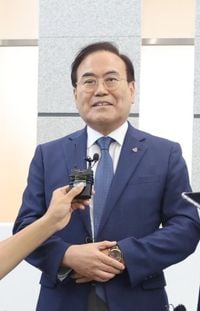On June 26, 2025, the Supreme Court of South Korea confirmed the nullification of Seo Geo-seok's election as Jeonbuk Provincial Superintendent of Education, a decision that has sent ripples through the local education community. The court upheld a ruling that found Seo guilty of publishing false facts during the 2022 local election campaign, specifically related to allegations of assault against a fellow professor during his tenure as president of Jeonbuk National University.
The Supreme Court's 2nd division, led by Presiding Justice Kwon Young-jun, affirmed the original judgment that sentenced Seo to a fine of 5 million won for violating the Local Education Autonomy Act. According to Article 49 of this law, which applies the Public Official Election Act to superintendent elections, any confirmed fine of 1 million won or more for election-related crimes results in immediate nullification of the election and loss of office. Consequently, Seo Geo-seok lost his position as Superintendent of Education on the very day of the ruling and is barred from running for any election for the next five years.
The case traces back to the June 1, 2022, local elections when Seo, then a candidate, was confronted during a televised debate by his opponent Cheon Ho-seong, a professor at Jeonju National University. Cheon raised suspicions that Seo had assaulted a fellow professor, Lee Gyu-jae, during Seo's presidency at Jeonbuk National University. Seo responded by categorically denying the allegations, stating, "There is no such fact." Following the debate, as the assault allegations became a focal point in the election, Seo further posted several statements on social media reiterating that he had never committed such violence.
These denials formed the crux of the legal charges against Seo. He was indicted for making false statements that influenced the election process. The initial trial acquitted Seo, with the court citing the victim professor's inconsistent testimony and insufficient evidence from the prosecution. Notably, Professor Lee himself testified ambiguously, at one point saying, "I don't remember if such an incident happened," which weakened the prosecution's case.
However, the appellate court took a different stance. It overturned the first judgment and found Seo guilty, imposing the 5 million won fine. The court reasoned that while direct evidence of assault was lacking, circumstantial evidence suggested mutual physical altercations had occurred. The court emphasized the significant impact Seo's false statements had on the integrity of the election, stating that such conduct "damaged the essence of the election system and representative democracy." Seo's appeals, along with those from the prosecution, were ultimately dismissed by the Supreme Court, solidifying the verdict.
The case has ignited strong reactions from educational and civic groups in Jeonbuk. Organizations such as the Minju Nodong Jeonbuk Headquarters, Jeonbuk branch of the Korean Teachers and Education Workers Union (JeonGyoJo), and Jeonbuk Education Solidarity held a press conference shortly after the ruling. They described the verdict as a "judgment of an anachronistic authoritarianism that tried to rule above the law," and expressed hope that it would serve as a "new starting point for educational justice in the region." These groups called on Seo to offer a sincere apology to the citizens of Jeonbuk and the approximately 200,000 students affected by his tenure.
They also urged law enforcement agencies to thoroughly investigate allegations related to personnel appointments, budget management, and policy execution during Seo's time in office, which had surfaced following his re-election. These demands highlight the broader concerns about governance and transparency within the Jeonbuk Provincial Office of Education under Seo's leadership.
In parallel, the Jeonbuk Association of Private School Councils (JeonbukGyoChong) released a statement emphasizing the need to minimize disruption in the education system amid this administrative upheaval. They stressed the importance of a smooth transition without any policy vacuum to prevent further chaos in schools and classrooms. Oh Jun-young, chairman of JeonbukGyoChong, remarked, "The critical issue now is not the political outcome but the learning of children and classroom stability." He affirmed the association's readiness to cooperate with any new leadership to restore trust within the education community.
The New True Education Forum (SaeCham Forum), another influential civic group, welcomed the court's decision as "long-awaited" and a necessary correction. They demanded Seo to formally apologize for the disappointment and harm caused to the people of Jeonbuk and its students. Additionally, they called for Seo to promptly return the 1.4 billion won in election subsidy funds following the nullification to fulfill his public responsibility. The forum also urged a comprehensive audit of the Jeonbuk Provincial Office of Education's operations, recommending that the Deputy Superintendent and the Provincial Council's Education Committee conduct the review without hesitation. If needed, they suggested initiating formal investigations to address any irregularities uncovered.
Until the next local elections scheduled for June 2026, the Jeonbuk Provincial Office of Education will be managed under a Deputy Superintendent acting as interim head. This arrangement aims to maintain administrative continuity and prevent policy gaps during this sensitive period.
The saga began in November 2013 at a Korean restaurant in Jeonju, where Seo allegedly slapped Professor Lee Gyu-jae during a dispute over a university presidential election bid. Seo, however, has consistently denied the assault allegations throughout the legal proceedings, including during the 2022 election campaign. Despite the initial acquittal, the courts ultimately found his denials to be false statements that influenced the election outcome.
This landmark ruling underscores the judiciary's firm stance against election-related misinformation and reinforces the principle that public officials must be held accountable for their conduct, especially when it undermines democratic processes. Seo Geo-seok's case serves as a potent reminder that integrity and truthfulness are indispensable in public service, and that attempts to distort facts for political gain carry serious consequences.
![[속보]‘허위사실 공표 혐의’ 서거석 전북교육감, 대법서 ‘당선무효형’ 확정](https://thumbor.evrimagaci.org/bz5BNuYAnG63ScA8fMzIQEampX8=/200x0/tpg%2Fsources%2Fec5474cf-3348-4ff4-88d1-e059c32c4e8d.jpeg)

